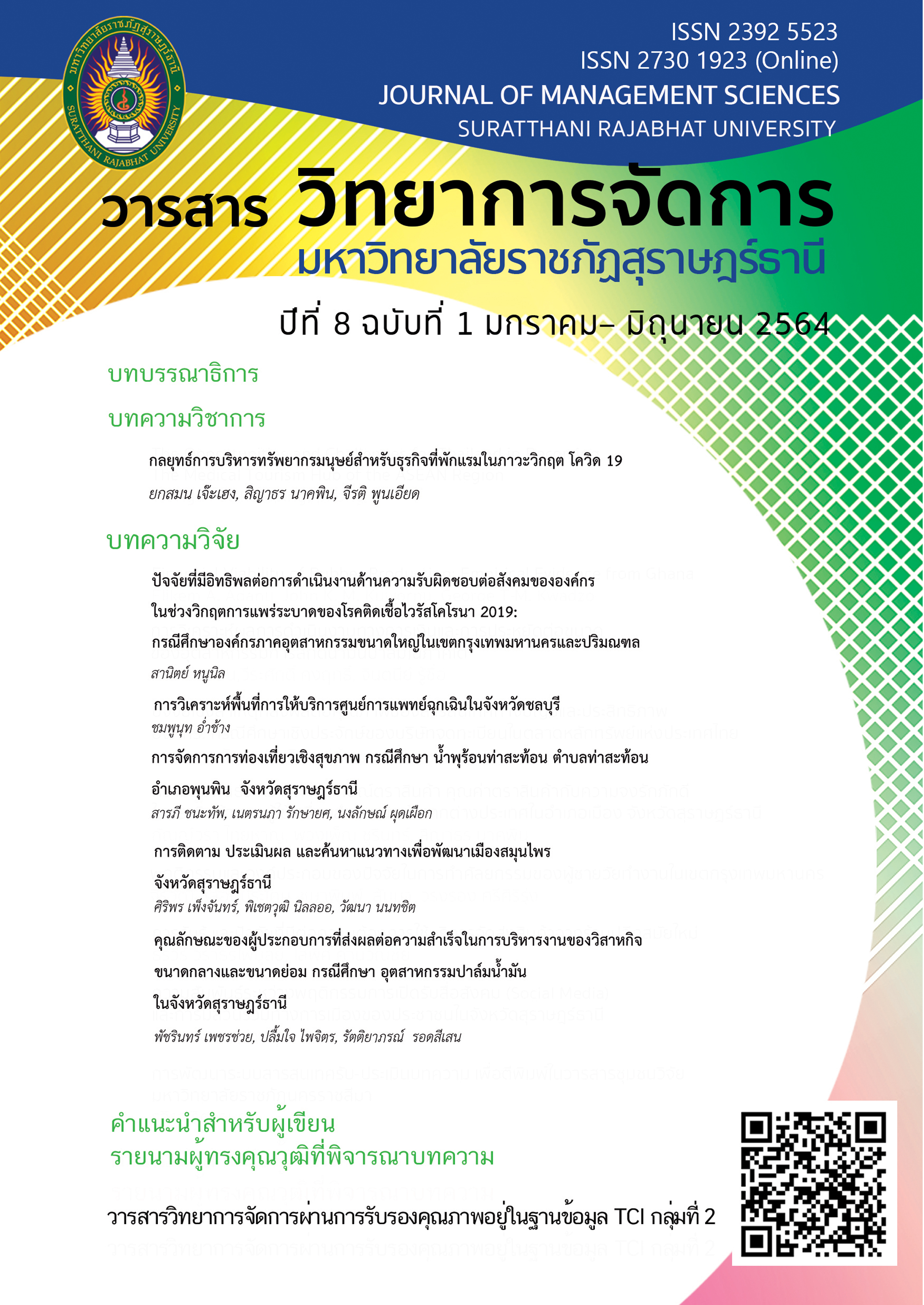ความรับผิดชอบต่อสังคมขององค์กรภาคอุตสาหกรรมในช่วงวิกฤต COVID-19
Main Article Content
Abstract
The objectives of this research were to 1) study the level of corporate social responsibility (CSR) functioning during the Novel Coronavirus 2019 (COVID-19) crisis in Thailand; and 2) analyze factors influencing CSR functioning during the COVID-19 crisis. Quantitative study was done with data were collected by questionnaire. Samples were managers of large industrial organizations operating in the Bangkok Metropolitan Area (BMA). To test the research hypothesis, data was statistically analyzed by multiple regression analysis (Stepwise Method). Results were that overall, organizations demonstrated CSR during the COVID-19 crisis at a moderate level in all aspects. Most organizations demonstrated CSR during the COVID-19 crisis more than before the crisis. Factors influencing CSR functioning during the COVID-19 crisis included transformational leadership, stakeholder engagement, and CSR policy. These findings reflect a knowledge of CSR functioning during the crisis through empirical study during the crisis, as an extension of knowledge obtained from previous studies. These results may be useful for CSR-related projects, especially during times of the COVID-19 crisis or other crises.
Article Details
References
10 พฤษภาคม 2563 จาก https://thaicsr.sharefile.com/share/view/sc11fa6d66064146b
สานิตย์ หนูนิล วิโรจน์ เจษฎาลักษณ์ และจันทนา แสนสุข. (2560). ปัจจัยเชิงสาเหตุและผลลัพธ์ของความ
รับผิดชอบต่อสังคมเชิงกลยุทธ์: การศึกษาเชิงประจักษ์ธุรกิจโรงแรมในประเทศไทย. จุฬาลงกรณ์ธุรกิจ
ปริทัศน์. 39(153), 59-84.
AccountAbility. (2011). AA1000 stakeholder engagement standard 2011. Retrieved from
http://www.accountability.org/images/content/3/6/362/AA1000SES%202010%20PRINT.PDF
Aaker D. A., Kumar, V., & Day, G. S. (2001). Marketing Research. (7th ed.). New York: John Wiley &
Son Inc.
Aldrich, H., & Auster, E. R. (1986). Even dwarfs started small: Liabilities of age and size and their
strategic implications. Research in Organizational Behavior, 8, 165–198.
Bass, B. M. (1985). Leadership and performance beyond expectations. New York: Free Press.
Bass, B. M., & Avolio, B. J. (1990). The implications of transactional and transformational leadership for
individual, team and organizational development. Research in Organizational Change and
Development, 4, 231-272.
Bowen, H. R. (1953). Social responsibilities of the businessman. New York: Harper and Row.
Cronbach, L. J. (1970). Essentials of psychological Test (5th ed.). New York: Harper Collins.
Dias, A., Rodrigues, L. L., & Craig, R. (2016). Global financial crisis and corporate social responsibility
disclosure. Social Responsibility Journal, 12(4), 654-671.
Fehre, K., & Weber, F. (2015). Challenging corporate commitment to CSR Do CEOs keep talking about
corporate social responsibility (CSR) issues in times of the global financial crisis?. Management
Research Review, 39(11), 1410-1430.
Freeman, R. E. (1984). Strategic management: A stakeholder approach. MA: Pitman.
Galbreath, J. (2010). Drivers of corporate social responsibility: The role of formal strategic planning and
firm culture. British Journal of Management, 21, 511-525.
Hair, F. J., Black, C. W., Babin, J. B., & Anderson, E. R. (2010). Multivariate Data Analysis (7th ed.).
Upper Saddle River, NJ: Pearson Prentice Hall.
Hu, Y., Chen, S., & Wang, J. (2018). Managerial humanistic attention and CSR: Do firm characteristics
matter?. Sustainability, 10, 1-18.
International Labour Organization. (2020). Family-friendly policy and other good workplace practices in
the context of COVID-19. Retrieved from http://www.ilo.org/gender/WCMS_740831/lang--
en/index.htm
Jnaneswar, K., & Ranjit, G. (2020). Effect of transformational leadership on job performance: Testing the
mediating role of corporate social responsibility. Journal of Advances in
Management Research, 17(5), 605-625.
Kalyar, N. M., Rafi, N., & Kalyar, N. A. (2013). Factor affecting corporate social responsibility: An
empirical study. Systems Research and Behavioral Science, 30, 495-505.
Lindgreen, A., & Swaen, V. (2010). Corporate social responsibility. International Journal of Management
Reviews, 12(1), 1-7.
Organisation for Economic Co-operation and Development. (2020). COVID-19 and responsible business
conduct. Retrieved from https://www.businesshumanrights.org/sites/default/files/documents/OECD_COVID-19%20and%20Responsible%20Business%20Conduct_Full%20Note.pdf
Ramasamy, R. (2020). Mapping the road to recovery for the industrial and energy markets amid
COVID-19. Retrieved from https://ww2.frost.com/frost-perspectives/mapping-the-road-to-covid-19-recovery-for-the-industrial-and-energy-markets/
Rodríguez, M. M. D. M. (2013). Is CSR in crisis?. Developments in Corporate Governance and
Responsibility, 5, 19-32.
Rovinelli, R., & Hambleton, R. K. (1977). On the use of content specialists in the assessment of
criterion-referenced test item validity. Tijdschrift voor Onderwijsresearch, 2(2), 49-60.
Seles, P. R. M. B., Jabbour, S., de. L. B. A., Jabbour C. J. C., & Jugend, D. (2018). “In sickness and in
health, in poverty and in wealth?” Economic crises and CSR change management in difficult
times. Journal of Organizational Change Management, 31(1), 4-25.
Tee, E., Asare, B. L., Opoku, T. R., & Tabitha, O-D. (2017). The effect of the 2008 financial crisis on
corporate social responsibilities: Evidence from multinational companies. Research Journal of
Finance and Accounting, 8(16), 20-30.
Weiers, R. M. (2005). Introduction to business statistics (5th ed.). Pennsylvania: Duxbury Press.


